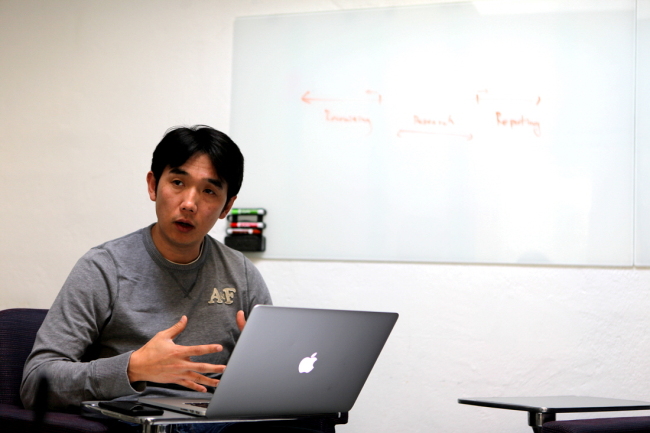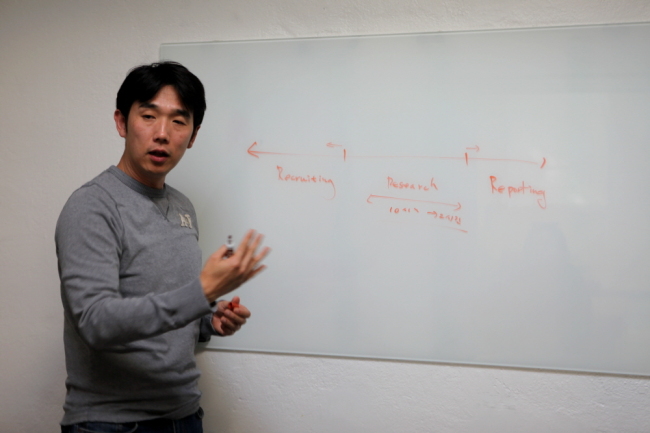Startups
[INTERVIEW] Methinks’ mission is to simplify customer research practices
[THE INVESTOR] PALO ALTO -- In Texas, a man absent-mindedly takes a sip from a can of coke as he peers into his smartphone. Sprawled across his couch, he looks quite comfortable, almost as if he has forgotten that he’s being watched.
The man has actually agreed to take part in a project where market researchers observe how people view certain content on their phones. Whether they are in their beds, on a couch, in the bathroom, eating or drinking and so on. This is all done through a simple research platform called Methinks.
In less than a year since its inception, Methinks is changing the dynamics of research to transform it from a daunting task where companies spend millions of dollars and a lot of time to meet and study people to just a simple matter of viewing them remotely.
“In sharp contrast, while customer behavior has been evolving quite quickly in the mobile-driven environment we live in, user research has been lagging,” according to Methinks co-founder and CEO Philip Yun.
 |
Methinks co-founder and CEO Philip Yun at his office in Palo Alto, California (The Investor) |
“There are many problems with conventional research methods. For instance, it usually takes eight to 14 days just to recruit the right candidates for a focus group, and you need to travel a lot and expenses can pile up.”
Methinks is aspiring to solve these problems, to ultimately make market research easier and more affordable. “Using our mobile-based platform, costs become at least 10 times cheaper or sometimes even 30 times. But what’s more important is the speed and a wider range of samples,” Yun said. Thanks to the high accessibility and low costs, companies requiring speedy yet accurate customer feedback are quickly catching onto Methinks.
The potential of the firm was so impressive that its first client remained faithful, even after parts of the research results were botched due to technical glitches. “Not a single sample was usable because of technical issues but the fact that we were able to recruit users from around the country (the US) in two days impressed our first client,” Yun said. The firm stayed on, and even introduced Methinks to more clients.
Yun, a Seoul National University graduate and a former head of Korea’s internet behemoth Naver’s Silicon Valley office, co-founded Methinks in December 2016 with 300 million won (US$277,230) worth of angel funding from investors including Kakao Chairman Kim Beom-Su.
It now has 1.5 million registered users -- or what methinks call “thinkers.” Out of those “thinkers,” some 800,000 users have completed lifestyle analyses. Methinks, currently only available on iPhones, will also branch out into the Android platforms.
In the second quarter next year, Methinks is expecting another round of funding so it can graduate from seed level to jump into Series A. It then plans to expand to other markets such as Japan, Spain and Germany.
“I see a lot of demand from American companies interested in foreign markets and vice versa and as user feedback research across the world is now easier and cheaper, I can imagine the birth of some unimaginable global products based on feedback accumulated from all over the world,” Yun said.
As Yun looks at the lucrative research market worth US$500 million a year, he expects competition, such as from online survey platforms such as SurveyMonkey or User Interviews that conduct UX research studies. Traditional market research firms and in-house units may also attempt to enter the market.
But in the meantime, Yun is confident that Methinks has a safe lead, as its “thinkers data” and real-time monitoring technology aren’t so easy to recreate.
Homepage: www.methinks.io
 |
Methinks co-founder and CEO Philip Yun at his office in Palo Alto, California (The Investor) |
Following are excerpts of the interview with Yun.
The Investor: Please introduce your team.
Yun: I co-founded Methinks with a friend I’ve been working with for eight years. He is a UCLA graduate and handles the back-end of our platform. There are five of us in the US and four people in Korea. We also have four contract workers including ladies who wanted to come back to part time jobs after maternity leave. We found that they make a great match for us, as we can be flexible, but need people who are experienced.
TI: Could you introduce Methinks?
Yun: Methinks is a mobile-based user research platform that links companies and users. Companies that want to conduct research on a product and get opinions from users can recruit the right candidates from our platform. We feel that while customer behavior has been evolving quite quickly in the mobile-driven environment we live in, user research has been lagging. Our platform could solve these problems.
TI: How competitive is your service compared to conventional customer research methods?
Yun: There are many drawbacks to conventional research methods. For instance, it usually takes eight to 14 days just to recruit the right candidates for a focus group. You need to travel a lot and expenses can pile up. Using our mobile-based platform, costs become at least 10 times cheaper or sometimes even 30 times. But what’s more important is speed and that we provide a wider range of samples.
TI: Who uses your service?
Yun: Companies use our services for various reasons. A big Korean game company wanted to test users before its US launch. Some venture capital firms want to see customer reaction to products by startups they want to invest in as part of due diligence. Startups use our service to test their products. For users, they can feel a sense of satisfaction that their opinion matters.
TI: How many users do you have now?
Yun: We have about 1.5 million registered users and 800,000 of them finished lifestyle analysis. When users see some projects that they could not participate in, they introduce them to their family members or friends who seem to fit the project.
We’re not making marketing efforts but we’re seeing organic growth, and companies are coming back.
TI: What kind of competition are you facing? Are you afraid of any copycats?
Yun: No, I’m not really afraid of copycats, at least here in Silicon Valley. If you hire top talent and ask them to copy some other company’s products, they would not be happy about it. I know there are some in-house market researchers who hate us because they think we are taking their jobs.
It might look simple but technologies we adopt such as real-time monitoring and mirroring technologies are not easy to copy.
TI: You’re compiling a lot valuable users data. Are you thinking about utilizing them?
Yun: We’ll focus on delivering objective data to our clients and making them understand easily.
TI: What is your plan for expansion?
Yun: Currently, Methinks platform is only available for iPhones but we will launch Android platforms in February next year. After the US, we will make a foray into Japan, followed by Spanish language and German language platforms.
TI: What is your funding situation?
Yun: We received 300,000 million won from our angel investors including Bon Angels, Kim Beom-su and Chang Byung-gyu.
We have raised 1.2 billion won so far this year. As we enter into a growth stage, we plan to proceed to Series A funding in May or June 2018.
TI: How did you first come to Silicon Valley?
Yun: I came to Silicon Valley in 2008 as the head of Naver’s Silicon Valley office. There were 40-50 people in the team. Two years after, I started my own business here but it did not do well. This is my second attempt and we pivoted to focus on user research platform.
TI: How come you did not start your business in Korea?
Yun: I don’t think Methinks platform would have done so well if we started in Korea. There is not much domestic demand for user research markets although there is a lot of need for the overseas market.
By Park Ga-young (gypark@heraldcorp.com)
This story was sponsored by the Samsung Press Foundation. - Ed.








